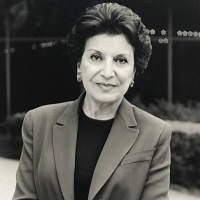Leading for Change: Women in Iran and the Journey to Freedom
Submit a question
The Wilson Center’s Middle East Program hosted leading women’s rights advocate and former Minister for Women’s Affairs of Iran Mahnaz Afkhami at the 2023 Haleh Esfandiari Forum.
Afkhami launched her journey in activism more than four decades ago. Prior to the 1979 Iranian Revolution, she played a key role in the passage of the progressive 1975 Family Protection Law as Iran’s Minister of Women’s Affairs, founded the Association of Iranian University Women, and served as Secretary General of the Women’s Organization of Iran. She is the founder and president of Women’s Learning Partnership, a partnership of 20 women’s rights organizations based in the Global South working in 28 languages in 60 countries to promote women’s leadership and human rights.
In conversation with MEP Director Merissa Khurma, Afkhami addressed the history and background of the women’s movement in Iran, as detailed in her new memoir The Other Side of Silence: A Memoir of Exile, Iran, and the Global Women’s Movement. Afkhami discussed some of the most imminent challenges facing women today, and the ways the international community can band together to support women and girls globally, but particularly in Iran where young girls and women are leading protests and calls for change.
Nearly six months after the death of Mahsa Amini, a 22-year-old Kurdish woman who died in the custody of the Islamic Republic’s morality police for allegedly wearing her hijab incorrectly, protests in Iran continue to spread across the country with women at the forefront. “The regime turned to what it knows best – tactics of repression: arrests over tens of thousands of prisoners who are currently in the Evin prison, the same prison Haleh Esfandiari was held in for 1005 days in 2006” noted MEP Director Merissa Khurma. Mahnaz Afkhami emphasized that women-led organizations of Iran have always known how to push the levers of power, and will continue to do so even in the face of significantly violent and repressive measures.
She attributed the resistance of this generation of women leaders to the consciousness-raising and mobilization of elder Iranian women, whose efforts made considerable progress during the Pahlavi era (1925-1979), and were unfortunately negated by the Islamic Revolution of 1979. As “granddaughters” of those women, Afkhami explained that Iranian women of today are using history as a model to dismantle systems of patriarchy, subjugation, and authoritarianism, and are setting a strong precedent for what can happen for the future of the MENA region and the world.
Afkhami hopes the state of women’s rights in Iran will eventually return to the pre-Islamic republic era, where gendered development directly responded to the needs of the people. As she and other women leaders began to survey public opinion of the prospects of certain policy implementations, they found that often such needs didn’t align with their initial assumptions.
Afkhami explained that prioritizing women’s economic independence is essential in addressing marriage law. “What’s the use of having the right to divorce if I have to end up in my father’s house instead of my husband’s?” She suggests skill-building and shifting the norms surrounding gender roles are effective ways to expand women’s agency. Further, she also calls on both men and women in Iran to combat oppressive practices that perpetuate violence against women in Iran.
Afkhami injects hope for what’s in store for women’s activism in Iran, and the potential to grow into a global movement. “People don’t actually grow and blossom because they’re being harassed and limited and told what to wear, eat, and who to sit next to – people begin to be aware of the rights they need and want and it’s not easy to take it away from them no matter what goes on around them.” As women and girls of this generation gain a stronger awareness of the efforts of those that came before them and still actively stand beside them, women in Iran are leading the way in the fight for justice and equality– and are putting up a strong fight.
Speaker

Moderator

Hosted By

Middle East Program
The Wilson Center’s Middle East Program serves as a crucial resource for the policymaking community and beyond, providing analyses and research that helps inform US foreign policymaking, stimulates public debate, and expands knowledge about issues in the wider Middle East and North Africa (MENA) region. Read more


Middle East Women's Initiative
The Middle East Women's Initiative (MEWI) promotes the empowerment of women in the region through an open and inclusive dialogue with women leaders from the Middle East and continuous research. Read more
